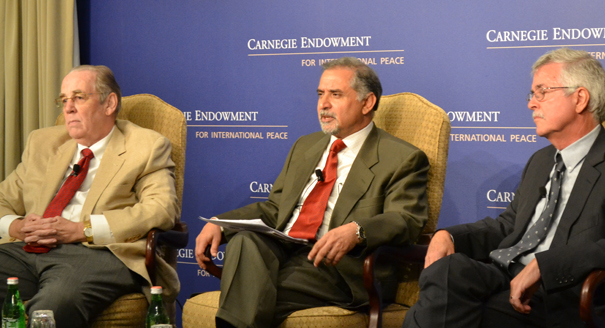Registration
Thank you!
You will receive an email confirming your registration.
IMGXYZ3870IMGZYXIndonesia—the fourth most populous nation on earth and the world’s largest Muslim country—is a vibrant, decentralized democracy that has enjoyed rapid and resilient economic growth. CastleAsia’s James Castle and the World Bank’s William Wallace discussed Indonesia’s recent successes in economic and political reform and analyzed challenges to future growth. Carnegie’s Vikram Nehru moderated.
Highlights of the Discussion
- Economic Challenges: Indonesia’s growth rate is high, but issues such as poverty, weak infrastructure, environmental degradation, and institutional weaknesses prevent the country from developing as quickly as it could, said Wallace.
- Economic Strengths: Wallace argued that the country’s economic strengths stem from the “tough decisions” Indonesia made after the Asian financial crisis in 1997. The government took a conservative fiscal position that has lowered the debt-GDP ratio to near 20 percent. Indonesian growth is being helped by “tail winds” including rapid urbanization, a demographic dividend from a young population, and strong commodity prices, he added.
- Policy Successes: Indonesia has a history of effective policymaking in tough times, including a 2005 increase in fuel prices, Wallace said. However, the legislature failed to pass another fuel price increase this year, causing Castle to comment that achieving tough or unpopular reform policies during periods of high stable growth may be difficult.
- Business Environment: Following Indonesia’s “big bang” decentralization, public and private financial resources, which had earlier been concentrated in the capital city of Jakarta, flowed to the outer regions and spurred higher growth rates there. This helped reduce growing inequality between the Jakarta and the rest of the country, correcting what Castle called a “fundamental injustice”.
- Economic Resilience: The Indonesian economy displayed considerable resilience during the recent global financial crisis and now enjoys the highest growth rate in Asia after China, panelists said. It appears to be weathering China’s slowdown and the euro crisis well, thanks to its well-balanced and diversified trade profile and its sound macroeconomic management and financial sector policies, panelists agreed. Foreign direct investment has reached all-time highs, and there is increased foreign investment in education and healthcare. Castle recommended that Indonesia can take advantage of high earnings from commodity exports to shift to a more diversified economic base.
- Institutional Weaknesses: On measures of governance, institutional strength, and corruption, Indonesia stills lags behind other countries in the region, panelists agreed. Wallace lauded recent efforts at institutional reforms, including Indonesia’s anti-corruption program and the establishment of a free press, but warned that the capacity of the civil service is not keeping pace with private sector development. Castle added that poor contract enforcement and weak regulatory and legal systems pose huge costs for small and medium enterprises. Such institutional weaknesses must be addressed if Indonesia is to grow at its full potential, he added.
- Islam, Religious Tolerance, and Stability: Castle considered the evolving role of Islam in Indonesia as reflective of broader global trends in religion and did not view it as a threat to stability. Nevertheless, he did express disappointment in the government’s response to recent incidents when minorities were threatened or attacked, but felt that this was beginning to change for the better.
- The 2014 Presidential Election: Castle noted that one reason for the lack of effective top-down institutional reform is that the Indonesia president wields much less power than in other democratic systems. The panelists discussed possible candidates for the 2014 presidential election. Given the constitutional limit of two presidential terms, incumbent President Susilo Bambang Yudhoyono is not eligible to stand again, leaving the race “wide-open,” especially since Yudhoyono has not endorsed a successor. Castle suggested that because Indonesia is a conservative and centrist country, there is little likelihood that any candidate will radically reshape the political landscape.
- Looking Forward: Overall, Castle predicted that no single party would earn more than 25 percent of seats in the legislative election. As a result, the greatest challenge for the incoming president will be to forge an effective coalition government and manage the fragmented political system. Panelists expressed concerns that a weak president might have difficulty reenergizing stalled reforms. Furthermore, a decade after democratic reforms, political parties still reflect oligarchic interests instead of political platforms based on broad popular concerns, Castle added.
- Indonesia’s Global Role: Indonesia has taken on a more positive and active role in the global climate debate, Wallace said, even as the country faces significant challenges in moving forward with its domestic environmental policy. Panelists agreed that Indonesia has contributed substantively to ASEAN’s effectiveness as a regional organization, and Nehru predicted that on regional issues such as the South China Sea and democratization in Myanmar ASEAN members will continue to look to Indonesia for leadership.
